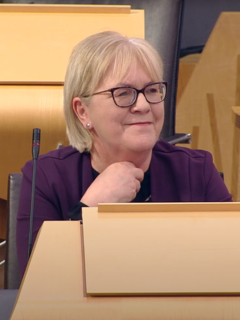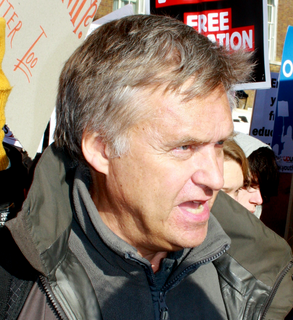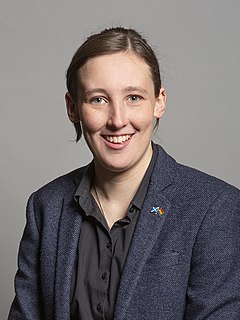The Scottish National Party is a Scottish nationalist and social democratic political party in Scotland. The SNP supports and campaigns for Scottish independence from the United Kingdom and for membership of the European Union, with a platform based on civic nationalism. The SNP is the largest political party in Scotland, where it has the most seats in the Scottish Parliament and 45 out of the 59 Scottish seats in the House of Commons at Westminster, and it is the third-largest political party by membership in the United Kingdom, behind the Labour Party and the Conservative Party. The current Scottish National Party leader, Nicola Sturgeon, has served as First Minister of Scotland since 20 November 2014.
The Labour Party of Scotland was a minor Scottish nationalist political party that was active in the early 1970s. Formed as a left-wing breakaway from Dundee's branch of the Scottish National Party (SNP), it is perhaps best known for standing in the Dundee East by-election of 1973, where its interference split the nationalist vote and probably cost the SNP a parliamentary seat as a result. The party contested elections to Dundee City Council two months later but was ultimately unsuccessful. It folded soon after, and by early 1974 most of its membership had returned to the SNP, whose campaigns on North Sea oil were proving popular with Scotland's urban electorate. It never had any official political representation.

Douglas Garven Alexander is a former Labour Party in Scotland politician who served as Member of Parliament (MP) for Paisley and Renfrewshire South, previously Paisley South, from 1997 until his defeat in 2015. During this time, he served as Scottish Secretary, Transport Secretary and International Development Secretary in the Cabinet under Prime Ministers Tony Blair and Gordon Brown. He subsequently served in Ed Miliband's Shadow Cabinet as Shadow Secretary of State for Work and Pensions and Shadow Foreign Secretary.

George Foulkes, Baron Foulkes of Cumnock PC is a Scottish politician and life peer who served as Minister of State for Scotland from 2001 to 2002. A member of the Scottish Labour Party and Co-operative Party, he was Member of Parliament (MP) for Carrick, Cumnock and Doon Valley, formerly South Ayrshire, from 1979 to 2005. He was later a Member of the Scottish Parliament (MSP), as one of the additional members for the Lothians region, from 2007 to 2011.
Douglas Henderson was a Scottish politician. He was Depute Leader of the Scottish National Party (SNP) from 1971 to 1973 and from 1979 to 1981. He served as a Scottish National Party Member of Parliament (MP) for East Aberdeenshire from 1974 to 1979, and held virtually every national office in the SNP, short of party leader. His political style has been described as "no-nonsense" and "very blunt and forthright". He was also known for his forceful public speaking, which former SNP leader Alex Salmond described as "messianic".

Robert Gordon Wilson was a Scottish politician and solicitor. He was the leader of the Scottish National Party (SNP) from 1979 to 1990, and was SNP Member of Parliament (MP) for Dundee East from 1974 to 1987. He was Rector of the University of Dundee from 1983 to 1986.

Johann MacDougall Lamont is a Scottish Labour Co-operative politician who served as Leader of the Scottish Labour Party from 2011 to 2014. She was previously a junior Scottish Executive minister from 2004 to 2007 and Deputy Leader of the Scottish Labour Party from 2008 until her election to the leadership in 2011. In addition to her ministerial and leadership roles, she has been a campaigner on equality issues and violence against women throughout her political career.

Margaret Patricia Curran is a Scottish Labour Party politician. She served in the British House of Commons as the Member of Parliament (MP) for Glasgow East from 2010 to 2015 and was Shadow Secretary of State for Scotland from 2011 until 2015. She was previously the Member of the Scottish Parliament (MSP) for Glasgow Baillieston from 1999 to 2011, and held a number of posts within the Scottish Executive, including Minister for Parliamentary Business, Minister for Social Justice and Minister for Communities.
Scottish Labour is a social democratic political party in Scotland. It is an autonomous section of the UK Labour Party. From their peak of holding 56 of the 129 seats at the first Scottish parliament election in 1999, the Party has lost seats at each Holyrood election until it returned just 22 MSPs at the 2021 election. The party currently holds one of 59 Scottish seats in the UK House of Commons, with Ian Murray having represented Edinburgh South continuously since 2010.
The Hamilton by-election in Hamilton, Lanarkshire, Scotland, was held on 2 November 1967. It saw a surprise victory for the Scottish National Party candidate Winnie Ewing. The SNP took 46% of the vote in a constituency which they had not even contested at the 1966 general election held the previous year, and gained the seat from the Labour Party with a swing of nearly 38%. Ewing did not retain the seat at the following general election, but the SNP have been continuously represented in the House of Commons ever since.

The Scottish Conservatives, officially the Scottish Conservative & Unionist Party, is a centre-right political party that operates in Scotland. It is the second-largest party in the Scottish Parliament and Scottish local government. The party has the second largest number of Scottish MPs in the House of Commons of the United Kingdom.

Douglas Cuthbert Colquhoun Young was a Scottish poet, scholar, translator and politician. He was the leader of the Scottish National Party (SNP) 1942-1945, and was a classics professor at McMaster University and the University of North Carolina at Chapel Hill.

The Glasgow Camlachie by-election was held on Wednesday 28 January 1948, following the death of the sitting Member of Parliament, Campbell Stephen.

Professor Christopher Harvie is a Scottish historian and a Scottish National Party (SNP) politician. He was a Member of the Scottish Parliament (MSP) for Mid Scotland and Fife from 2007 to 2011. Before his election, he was Professor of British and Irish Studies at the University of Tübingen, Germany.

The Motherwell by-election was held on 12 April 1945, following the death of Labour Party Member of Parliament (MP) for Motherwell James Walker.

Iain Macwhirter is the political commentator of The Herald, an author and documentary film and radio presenter and a former Rector of Edinburgh University. He has worked at both the UK Parliament and Scottish Parliament, presenting the BBC2 programmes Westminster Live, Scrutiny and, from 1999, the BBC TV Holyrood Live programme from the Scottish Parliament.

Owen Peter Jones is a British newspaper columnist, political commentator, journalist, author, and left-wing activist. He writes a column for The Guardian and contributes to the New Statesman and Tribune. He has weekly web series, The Owen Jones Show, and The Owen Jones Podcast. He was previously a columnist for The Independent.

Mhairi Black is a Scottish politician. A member of the Scottish National Party (SNP), she has been a Member of Parliament (MP) for Paisley and Renfrewshire South since 2015, when she defeated Labour's Shadow Foreign Secretary Douglas Alexander. She was re-elected in 2017 and again in 2019.

Campaign for Socialism (CfS) is an autonomous pressure group of Scottish Labour Party members and supporters who campaign for left-wing policies and candidates within the party. In 2016, CfS agreed to a joint membership scheme with Momentum, a UK-wide grassroots movement supportive of Jeremy Corbyn and his leadership of the Labour Party.














